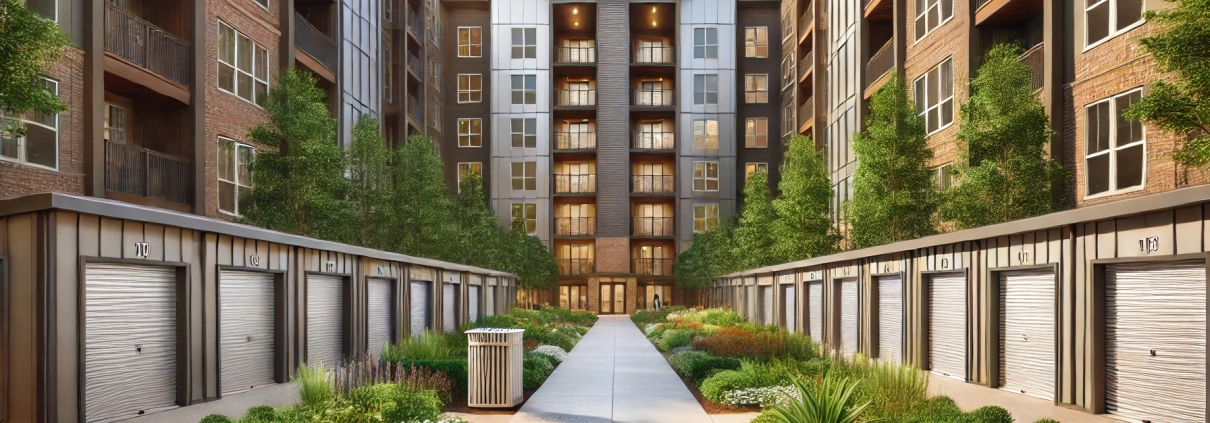Storage Income
In real estate underwriting, Storage Income refers to income derived from renting storage space to tenants. In apartment, office, retail, and industrial underwriting, Storage Income is generally an Other Income item given that the storage space is typically leased to existing tenants at the property.
Putting ‘Storage Income’ in Context
Overview of the Scenario
Longview Capital Partners, a real estate private equity firm, has recently acquired a market-rate multifamily property called The Cascades at Barton Creek in Little Rock, Arkansas. The property is a 150-unit garden-style apartment community built in 2015, offering a mix of one-, two-, and three-bedroom units. As part of its underwriting process, Longview Capital Partners identified an opportunity to generate additional revenue through storage income.
Storage Space Details
The Cascades at Barton Creek has 30 individual storage units located on-site, each measuring approximately 5 feet by 8 feet (40 square feet per unit). These storage units are housed in a dedicated storage facility on the property, separate from the residential units. Longview Capital Partners plans to lease these storage units exclusively to current tenants as an additional amenity.
Storage Income Opportunity
When underwriting the deal, Longview Capital Partners noted that similar apartment communities in the Little Rock market charge an average of $50 per month for storage units of comparable size. Using this market rent, they project monthly storage income as follows:
- Total storage units: 30
- Monthly rent per unit: $50
- Monthly storage income: 30 units x $50/unit = $1,500
- Annual storage income: $1,500/month x 12 months = $18,000
By incorporating this $18,000 in projected annual storage income into their underwriting model, Longview Capital Partners enhances the property’s total income, which increases its Net Operating Income (NOI) and, in turn, its valuation.
Impact on Property Valuation
To illustrate the impact of storage income on the valuation, consider a simplified direct capitalization approach. Suppose the market cap rate for similar properties in Little Rock is 6.0% (0.06). The additional value created by the $18,000 in annual storage income can be calculated using the following formula:
- Value increase = Additional Income / Cap Rate
- Value increase = $18,000 / 0.06 = $300,000
This calculation shows that the $18,000 in annual storage income could add approximately $300,000 to the property’s value using a 6.0% cap rate. This is a key insight for investors and underwriters, as small operational enhancements like storage units can create meaningful increases in property value.
Conclusion
The concept of “Storage Income” plays a vital role in the valuation and underwriting of multifamily properties like The Cascades at Barton Creek. By leasing 30 storage units to tenants at $50 per unit, Longview Capital Partners generates an additional $18,000 in annual income, which in turn increases the property’s value by approximately $300,000 at a 6.0% cap rate. This example highlights how a relatively minor operational feature can create significant returns for property owners and investors.
Frequently Asked Questions about Storage Income in Real Estate Underwriting
What is Storage Income in real estate underwriting?
Storage Income refers to revenue generated by leasing storage space to tenants. In underwriting, it’s typically categorized as Other Income, especially when the storage units are rented to existing tenants at the property.
How is Storage Income treated in underwriting models?
Storage Income is added as an Other Income line item in the property’s operating statement. It contributes to Effective Gross Income (EGI) and ultimately increases Net Operating Income (NOI) and property valuation.
How did Longview Capital Partners generate Storage Income at The Cascades?
At The Cascades at Barton Creek, Longview Capital Partners leased 30 on-site storage units to tenants at $50 per month, projecting $1,500 per month or $18,000 annually in Storage Income.
What is the impact of Storage Income on property valuation?
Using a 6.0% cap rate, the $18,000 in additional annual income translates to a $300,000 increase in property value:
$18,000 / 0.06 = $300,000
Why is Storage Income important for multifamily properties?
Storage Income allows owners to enhance income with minimal additional expense. It boosts NOI and valuation, making it a strategic revenue stream in multifamily underwriting.
Who are typical users of the storage spaces in these properties?
Storage units are typically leased to existing tenants who need extra space for personal belongings, seasonal items, or small furniture, providing a convenient and on-site solution.
How are comparable storage rents determined in underwriting?
Underwriters assess market comps from similar properties. In this case, Longview Capital Partners based their $50/month pricing on average storage rents in comparable Little Rock apartment communities.
Click here to get this CRE Glossary in an eBook (PDF) format.

